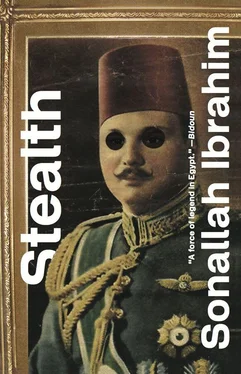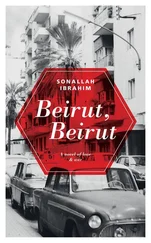I hear father’s voice calling my name, so I run over to him. He shouts at me for leaving him alone. We head over to the other side of the building. There is a pack of country women sitting on the ground with their children. We go into a big, crowded room. She sits in the front row next to my grandma. She wears a black silk coat and she has a sheer grey scarf wrapped around her head. She is taller and wider than she was the last time I saw her. Grandma looks over her shoulder, worried. A strange smile is painted on her face. She looks at me without blinking. Her pale brown face is surrounded by a faded, off-white scarf. Mother notices me. I can’t tell if she knows me or not. She suddenly talks to me in a very normal voice, like we’ve never even been separated: “How are you?” She doesn’t ask me to sit next to her. She turns back to pay attention to the judge. She listens to a sheikh in a caftan and turban wearing reading glasses. I turn around looking for my father. He waves to me from the entrance to the hall. I go to him.
We squeeze ourselves on to the end of the bench pushing over the others sitting there. We notice Selim sitting up in the front row. The judge’s stand is up at the front. Lawyers gather in front of him, including Dr. Mandour in his black coat. They’re talking to each other, but we can’t hear them. Hajj Abdel ’Alim is standing behind iron bars. The judge says something that makes the lawyers all stand back. The clerk calls out for the other accused people to come in. All of a sudden, the hearing ends and the judge disappears through a door behind the judge’s stand, followed by his helpers. The people sitting down get up and walk over to the cage holding the accused. The prisoners start calling out to their friends and relatives. Hajj Abdel ’Alim notices us. He seems very happy and not scared.
We leave the courtroom and head out to the right. After a short walk, the Abbadin Palace comes into view. Alongside I can see the wide square stretching out in front of it. We stand in rows from the early morning all the way through to the afternoon. The school official is leading us. We’re wearing the blue shirts that they’ve passed out to us. They look like nursery school uniforms. We wait for the appearance of the king to celebrate him on the anniversary of his coronation.
We turn to the left and go down a street with lots of shady trees. We stop in front of a fancy building. A Nubian doorman meets us. We get into a clean elevator. It goes up slowly without making a sound. I sit down on a seat fastened to the wall. We stop at the fifth floor. We knock on the door of Tante Zeinab’s apartment. Her black maid Zahra opens the door for us. She welcomes us and pulls me to her chest. She kisses my cheek. I know her whole story from father. She was owned by Tante Zeinab’s family before the Khedive Ismail outlawed slavery, but she had no idea who her family was or where she had come from, so she stayed on to work for Tante Zeinab.
We sit down in a cozy sitting room by the front door. Family pictures hang on the wall. Tante Zeinab shows up after a while. She moves slowly. Dark and short. She pants the whole time because she has a weak heart. “How are you, my brother?” I know she is my father’s cousin from his mother’s side. And that she was engaged to him when he was young, before he married Um Nabila. She never got married after that, and she lives with her brother Shams, who also has never married, even though he is very old too. She looks at me, smiling gently. Zahra sits at her feet. Father asks: “How’s your health?” She says: “Fine. All that God brings is fine. Any news of Rowhaya?”
“None.” The iron door is closed. In front of it are neighborhood women and their children. They are looking through a big crack in the coated glass. I can see mother through it, standing in front of the door to the apartment. Grandma is beside her. . and the daughters of the landlord. My father is all dressed up. His head is bare. She is screaming: “You want to poison me? You’ve put poison in here.” She points at a glass cup sitting on the banister. Father says in a quiet and tired voice: “Relax. Drink up and it’ll calm you.”
She says as she pants for breath: “Have you had lunch, my brother? We just ate and Shams has gone for a nap.” She makes a big effort to get up. We follow her inside. An untidy room with no furniture in it except a round table with chairs. We sit around it. Zahra brings us spaghetti and green salad. She serves me. She sprinkles grated Egyptian Romano cheese on my plate. I try to use the fork. It is the first time I’ve eaten pasta with cheese. I don’t finish all of it. Tante Zeinab asks her to open a jar of fruit compote. She brings in a stained glass jar and serves me pieces of apple and pear. She adds a spoon of syrup.
I go to the bathroom with father. Some machine is hanging on the wall. There is a drawing of a flame on it with the words “Shell Gas” above it. Father says it is to heat the water. We go back to the room at the entrance. Zahra brings a cup of coffee for father. He asks Tante Zeinab how much the water heater costs. She says: “Sixteen pounds.” They ask each other questions about members of the family.
“Do you see Nabila, my brother?”
“Yes.”
“How’s she doing?”
“Well. .” He stops and looks at me. He tells Zahra to take me to the balcony. I go along with her even though I don’t want to. I steal a glance behind me. Father is talking in a low voice. He looks like he is saying something really serious. We go out on to the small circular balcony. From its left hand corner, I can see the wide, empty square in front of the palace. He carries me in his arms and sets me down on the iron fence. His strong hand rests on my knees. I look out at the crowds gathered in the square.
I draw a map showing the ground levels on the African continent. I mark the high ground and the low spots. I mark off arrows showing the directions of the winds. Suddenly, a shout goes up from the alley. I run to the balcony. The alley is dark. The shouting is coming from the apartment of Siham and Selma. I turn my head to look at the entrance to the alley. I am waiting for father to come back from visiting Hajj Abdel ’Alim to congratulate him on being let out of jail. I turn around and go back inside. I get right up to the door to our room. I listen. The light in the living room is on. I can hear the sound of Fatima in front of the sink. She cleans the glass of the gas lantern. She hangs it on a nail over the sink and then disappears into the kitchen. I go out into the hall. I carefully go up close to the door to the washroom. I can hear her lighting the kerosene lamp.
I go back to the room. The light goes out suddenly. I call to her. She answers. Her voice is coming closer. She says the box of matches is empty. She tells me to look around for another one.
“Where?”
“In your room. Check the pockets in your papa’s robe.”
I feel my way in the dark towards the clothes stand. I stretch my hand into the pocket of the robe. I call out: “Nothing.” She yells back: “Bring a sheet of newspaper.” I try to remember where some newspaper might be. I tear off a page from the back of the geography notebook.
I shout: “Here’s the paper.”
“Give it here.”
“No. Come here and get it.”
“I can’t see because of this dark.”
I can smell in her voice that she’s scared. “Neither can I.”
I go up close to the door of the room. As I step into the hall, I am scared to death: “Here I am.” I bump into her. She snatches the paper from my hand. Um Ibrahim is sitting on the floor in the middle of the hall in front of the oil burner. Her hair is uncovered. It’s curly and red, all washed with henna. The color of her eyes is more like grey ash. You can see that she is scared. Mother is sitting in front of her on a chair. She orders her to boil the cucumbers. Um Ibrahim looks shocked: “Boil them? Do you boil cucumbers, madam?” Mother shouts at her: “What do you care? Just do as I tell you.” “Yes, madam. Of course. Just don’t scream please, madam.” She throws the cucumbers into the pot that sits on the fire. I am carrying a cup of coffee in my hand. Mother gets up. She takes a key from her breast pocket. She unlocks the door to our room. I carry in the cup of coffee carefully. My father takes it. I tell him what just happened with Um Ibrahim. He laughs: “Serves her right. She’s been driving me crazy.”
Читать дальше












